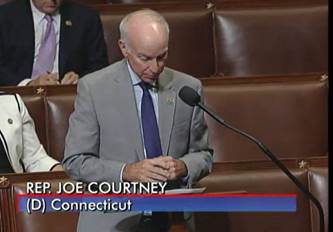The Strengthening Career And Technical Education For The 21st Century Act Passes The House
“For my region, passage of this bill is not just feel good legislation, but is a critical, existential requirement”
WASHINGTON, D.C.—Today, Congressman Joe Courtney (CT-02), a member of the Education and Workforce Committee, announced that the Strengthening Career And Technical Education For The 21st Century Act (H.R. 5587), passed the U.S. House of Representatives on Tuesday night with strong bipartisan support. Courtney is a strong supporter of the legislation which passed the Education and Workforce Committee unanimously. The bill will reauthorize the Carl D. Perkins Career and Technical Education Act of 2006 which is designed to provide additional support for secondary and postsecondary students pursuing a technical education. H.R. 5587 will now head to the Senate for further action.

Click here to watch remarks delivered by Congressman Courtney in support of H.R. 5587 last night
Courtney made the following remarks in a speech strongly supporting the measure on the House floor:
“I rise in strong support of H.R. 5587, which addresses the most urgent workforce challenge in our nation by updating and strengthening career and technical education programs at the secondary [and post-secondary] education levels. First, the good news: all across the country there is an exciting and growing need for trade and technical skills to fill jobs that young people can build a career and life around.
“Advanced manufacturing opportunities in aerospace, maritime, and even healthcare are happening from coast to coast, and the question of the day for many employers is whether our education and job training systems are ready to fill the need. Recent updates to K-12 and job training programs signed into law by President Obama in 2014 and 2015 built a positive platform to address this challenge, and passage of this bill for tech school programs will add to that capability.
“In southeastern Connecticut where I hail from, the U.S. Navy’s demand signal for new Virginia Class and Columbia Class submarines is projected to require up to 14,000 new hires in metal trades, and design and engineering over the next ten years. For my region, passage of this bill is not just feel good legislation, but is a critical, existential requirement. I strongly urge passage of this bill, and quick concurrence by the Senate.”
H.R. 5587 reauthorizes the Carl D. Perkins Career and Technical Education Act (Perkins) until 2022. Perkins was first authorized in 1984 to provide federal assistance for state and local career and technical education programs, and help prepare both secondary and postsecondary students with the academic and technical skills required to be successful in the growing high-tech workforce. It is important to note that Perkins aims to prepare students for both careers and college tracks.
The measure passed in the House this week will align Perkins programs with two landmark bills passed in recent years by the House Education & Workforce Committee of which Courtney is a member: the Every Student Succeeds Act (ESSA) and the Workforce Innovation and Opportunity Act (WIOA). Specifically, thus reauthorization builds on past successes of Perkins and focuses on ways to serve both workers and employers by: aligning career and technical education programs to the needs of state and local labor markets, supporting close collaboration between schools and employers, increasing student participation in work-based learning opportunities, and promoting the use of industry-recognized credentials and certificates.
Courtney has been closely involved with efforts to align workforce training programs to meet employer needs in eastern Connecticut. Most notably, he worked with leaders of the Eastern Connecticut Workforce Investment Board (EWIB) to secure $6 million in federal funding for their “manufacturing pipeline” program, which is helping to meet the growing demand for highly skilled technicians at Electric Boat and other manufacturers in the region. With Electric Boat projected to hire 14,000 workers over the next 15 years to meet growth and attrition in its workforce, alignment of training programs and employer needs is critical.
The new reauthorization of Perkins will allow entities like EWIB to work with local high schools and expand its partnership with both community colleges and traditional four-year institutions in eastern Connecticut to effectively place job seekers with local manufacturers.
###